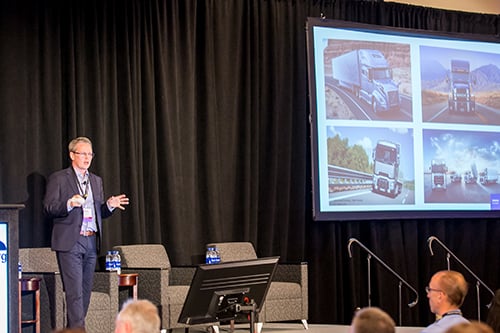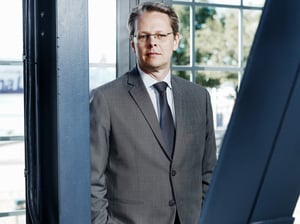
At last month’s Quality Summit, we were thrilled to welcome Martin Ranäng of Volvo Truck Group as our industry keynote speaker. Following his crowd energizing keynote address – which he will remember as “one great moment in my work life” – we sat down with Martin to discuss the changing industry, how he juggles responsibilities as senior vice president of supplier quality & development, what advice he’d give his younger self, and more!
In addition to expressing our appreciation for Martin’s contributions at the summit, we’d also like to thank Mark Troup – a member of AIAG’s Quality Steering Committee – for helping arrange for Martin to join us this year.
Read on for more from Martin Ranäng, and don’t forget to mark your calendar for next year’s Quality Summit, October 13-14, 2020.
AIAG: How has the industry changed since you started?
 Ranäng: Like I said in my presentation, I didn’t see much change until a couple of years ago. Something we see in projects today is that you don’t have all the prerequisites set when you start a project because things are happening along the way, and the market is changing so fast. What I see coming now, of course, is new technologies and new players.
Ranäng: Like I said in my presentation, I didn’t see much change until a couple of years ago. Something we see in projects today is that you don’t have all the prerequisites set when you start a project because things are happening along the way, and the market is changing so fast. What I see coming now, of course, is new technologies and new players.
Business models are also changing in our industry. Today we sell a truck to someone, earn money on that, and then earn more money on selling services and service parts. But in the future, it’s more likely that we’re going to have more customers saying, ‘I’m not interested in buying a truck from you, I’m interested in buying a transport service.’
Then on a macroeconomic scale, industry’s changing in terms of local content needs. Many years ago, we had a completely global supply base, and now that needs to be reduced somewhat because some countries have decided they want to set up demands for local content and so forth. That also means we need to develop and have multiple suppliers for certain parts because of meeting legislation in various countries.
AIAG: How do you juggle competing responsibilities (e.g. managing a large, global staff with a large supply base) associated with your position?
Ranäng: I think it starts off with me and my management team making a vision that is valid for all of supplier quality around the globe: why are we here, and what is it that we want to achieve? When we build this vision, all of my direct reports around the world join in. So that’s one of the things: we need to have a common vision.
Also, I meet engineers all over the world, and they’ve always been able to come up to me and talk with me face to face. I think I’m pretty accessible, but I am really not into micromanaging. If you have an organization of 300 people, you have to release the power of those 300 people, instead of being the one that needs to be in all details and steer everything.
On the other hand, with this automotive network I have, knowing so many people around the world, I also know that if something happens, within an hour I can have all the information I need, because I know exactly who to call and get the information.
AIAG: What advice would you give to your younger self, or someone just starting out in the industry?
Ranäng: First of all, network – because you have to work with others. Be a team player. I think the best thing you can do if you want to be a good team player is to take the first step. Don’t sit around waiting for others to approach you – approach others. And if you do that, if you take the first step, most people will give you back the same thing. You have to work cross-functionally at every company.
Another thing is to get your hands dirty. Get out there, see for yourself, learn by doing. And the last thing, I think, is being positive and open to change. Because today, like I said, this industry is changing more than ever.
AIAG: In your opinion, what are the biggest challenges we face when developing the next generation of automotive professionals?
Ranäng: One of the problems we have – if you look at purchasing – when young people come into purchasing as buyers, they stay for a year or two which is not always long enough to really learn your job. I’m almost having the opposite “problem” with supplier quality. They stay for longer, sometimes all the way up to retirement. All organizations benefit from having a healthy turnaround and exchange of competences coming in and going out.
The problem is, to be a really good supplier quality engineer, you need to know so much. There’s a lot of detailed knowledge that you need to have to be a supplier quality engineer. So, you have to have a deep technical interest. And probably also the willingness to stay for a while, because there is so much you need to learn to become good – it takes time. The willingness to stay and grow I think is a challenge we have.
AIAG: What book, publication, or resource would you recommend to others in the industry for professional development and education?
Ranäng: They’re not really related to supplier quality, but there are two books I really like. One is The Advantage, by Patrick Lencioni; it’s about organizational health and how an organization should work together to be competitive. It is an easy book to read, and that concept is actually something we have deployed in many parts of Volvo. Giving one example, he talks a lot about something called ‘Team #1,’ meaning that you can never expect your direct reports to work well with others at that level, unless that management is coherent and works well together.
And then I read a book many years ago, called The Goal, by Eliyahu Goldratt and Jeff Cox. It’s interesting; it talks about something called “OPT,” I believe – Optimized Production Technology – but it’s written like more of a novel, like a story. That was more of a fun book to read.
The resource you should connect with are your colleagues. Work with your colleagues – not only in your own function, but also in other functions. Again, build your network, and tap into that as much as possible. They need to understand your problems, hurdles and roadblocks as well as you need to understand theirs. Everybody in the organization, regardless of organizational level, needs to have a personal relationship with peer in other departments.

